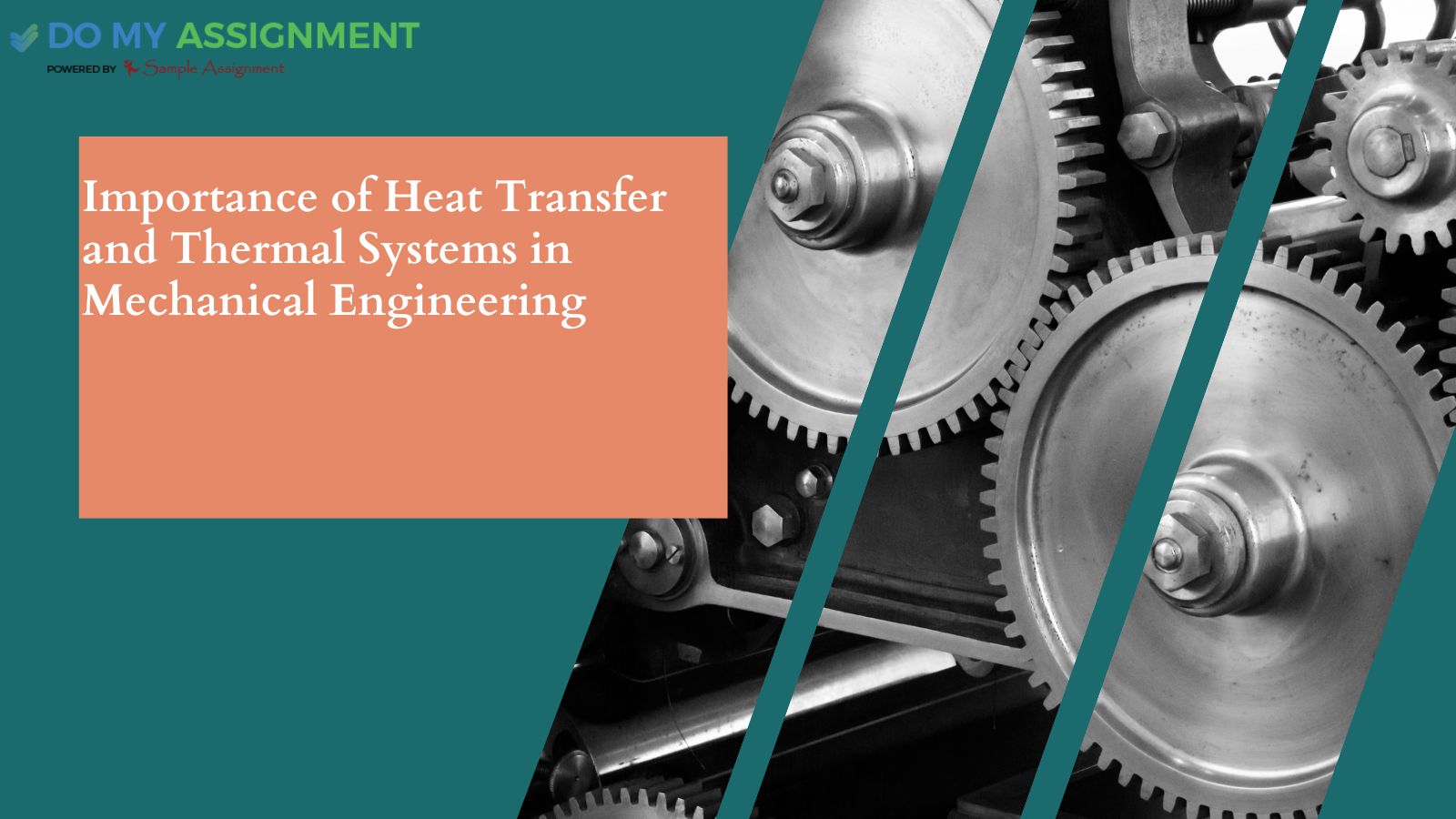Importance of Heat Transfer and Thermal Systems in Mechanical Engineering
Mechanical engineering relies heavily on heat transmission as well as thermal systems for a wide range of uses. Students can learn more about this topic in their colleges with Do My Assignment assistance. They can design, analyze, or optimize any mechanical system by adhering to these fundamental principles. This article will discuss the critical role those thermal systems as well as heat transport play in mechanical engineering.
What is Heat Transfer?
The term “heat transfer” refers to the movement of thermal energy from a hotter to a colder area. Keeping the proper temperatures in many mechanical systems is essential. Conduction is a usual heat transmission mechanism. When it comes to heat exchanger design as well as material thermal conductivity, for example, conduction is a useful tool in mechanical engineering’s sister discipline of materials science. Electronic equipment relies heavily on conductivity to function properly and avoid overheating during use.
Heat exchangers, a radiator, as well as engine cooling systems all make use of convection additional heat transfer techniques. In aerospace, temperature control is essential for the safe reentry of spacecraft, and in the electrical industry, it is essential for the effective cooling of power plants. With Do My Assignment Online, students can learn more about power plants, which are a part of mechanical engineering chapters in their colleges. Convection plays a crucial role in heating, ventilating, and air-conditioning (HVAC) systems and other mechanical methods used to keep buildings comfortable year-round. This exemplifies the wide variety of contexts in which heat transfer is useful in mechanical engineering.
What is a Thermal System?
Power plants and factories are just two examples of the many fields of use for thermal systems. Because of its significant bearing on energy use, financial burden, and ecological viability, thermal system efficiency is of paramount importance. Thermodynamics is the study of heat and its applications; it is a cornerstone of mechanical engineering. Engineers can study and improve energy conversion processes by applying the First as well as Second Laws of Thermodynamics.
Power plants often use thermal systems, such as steam turbines as well as gas turbines. Engineers exert a lot of effort to make them more efficient, decreasing their need for fuel and their contribution to global warming. Students can learn in detail about this topic in their universities with Do My Assignment Online assistance. The principles of thermodynamics are also crucial in developing internal combustion engines, further highlighting the importance of thermal systems in the automobile sector. Engineers can improve these engines’ performance and gas mileage by maximizing combustion efficiency as well as heat transfer.
Heat transfer and thermal systems are critically important in mechanical engineering and have far-reaching implications in fields as diverse as microelectronics, aircraft, power generation, as well as automotive engineering. Engineers are continually on the lookout for new ways to improve mechanical systems’ energy efficiency, long-term viability, and performance therefore, this discipline is always developing.
What is the Impact of Heat Transfer and Thermal Systems in electronics as well as microelectronics industries?
In the electronics as well as microelectronics industries, heat transport and thermal management are of paramount importance. As electronic devices shrink and gain power, thermal management becomes increasingly difficult. When designing electronic circuits and electronic packaging, heat conduction is crucial. Avoiding overheating and ensuring the dependability of electronic equipment depends on effective heat evacuation from microprocessors as well as other electronic components. Engineers find solutions to these thermal issues through a variety of means, including the use of heat sinks, thermal interface materials, as well as microchannel cooling.
Mechanical Engineering’s Exposure to Heat Transfer and Thermal Systems’ Repercussions
Heat transfer and thermal systems have far-reaching and far-reaching impacts in mechanical engineering, affecting many facets of mechanical system design, operation, and management. Key effects include the following:
● Enhancing Productivity:
Enhanced productivity is one of the most noticeable results. Mechanical systems can function to their maximum potential and reduce energy waste with effective heat transfer and thermal control. This results in lower energy requirements and expenses for everything from transportation to power generation.
● Consistency and longevity:
When mechanical parts and systems have efficient heat transmission and thermal systems, they are more likely to last for their intended lifespan. Overheating can cause premature failure or shorten the lifespan of a component, thus, it’s important to regulate heat effectively. These systems keep everything running at just the right temperature, which increases the longevity of vital parts and decreases the frequency of necessary repairs.
● Effects on the Environment:
Heat transmission and thermal systems have significant implications for the natural world. Efficient thermal systems lessen the release of greenhouse gases during power generation as well as transportation, making for a greener planet. More sustainable production practices are possible through better heat management in mechanical engineering.
● Creation of New Products and Methods:
When it comes to mechanical engineering, it’s all about heat transport and thermal systems. In order to enhance the functionality of mechanical systems, engineers are consistently creating novel heat exchangers, cooling methods, and thermal materials. Products like high-performance engines and energy-efficient heating and cooling systems are only two examples.
● Using Less Energy
Heat pumps and other energy-efficient thermal systems help reduce carbon emissions. Building heating and cooling systems can benefit greatly from well-designed thermal systems, which can drastically cut costs. This effect is crucial in a society where everyone is working to conserve energy and lower their carbon impact.
● Human Effort and Safety:
Keeping individuals using mechanical devices safe and comfortable requires careful heat transmission and thermal systems management. For instance, buildings’ heating, ventilation, and air conditioning (HVAC) systems keep the interior at a healthy temperature. Overheating engines can cause dangerous failures on the road, making thermal systems an essential part of the automobile industry.
● Aerospace Technology and Space Exploration:
Heat transport and thermal systems play a crucial role in aerospace engineering as well as space exploration. Learn more about it with Do My Assignment. Also learn how safety of humans and spaceships during re-entry depends on effective thermal protection systems. The success of scientific investigations and exploratory missions in orbit relies on perfect heat regulation to protect delicate instruments as well as equipment.
Conclusion
When it comes to mechanical systems, heat transfer and thermal systems possess a significant effect on efficiency, dependability, sustainability, and safety. Learn more about it with Do My Assignment assistance. However, when it comes to modern issues like energy conservation, responsibility for the environment, as well as technological innovation, these effects are essential game changers that have shaped the discipline of mechanical engineering.




